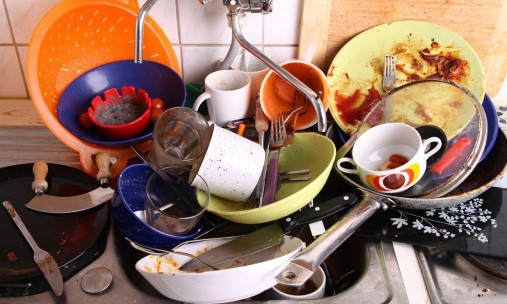
They have long been ridiculed for relying on a diet of takeaways but now it seems students’ filthy kitchens are to blame.
A new survey has revealed unwashed hordes of British students are slumming it more than ever with a third being put off preparing fresh food because of their grotty digs.
That is despite huge numbers wanting to be the next Delia Smith by taking their cooking almost as seriously as their studies.
Raechel Mattey, vice president of the National Union of Students (NUS), said: “Students historically have a ‘can’t cook won’t cook’ reputation.
“While the research shows they are keen to prepare fresh food, it is very concerning that something as simple as the state of their kitchens may be putting them off.”
They certainly see themselves as dab hands in theory, with a massive 94% of Scots students claiming they are keen cooks.
Those surveyed in north-west and north-east England were similar to their undergraduate pals north of the border with 84% and 79% respectively admitting to enjoying cooking from scratch. But they are still failing to shed the grubby student image immortalised by 80s sitcom The Young Ones especially when it comes to kitchens.
The dirtiest are those in university halls of residence and privately-owned shared houses, according to the survey of nearly 3,000 students across British universities by NUS and the Co-operative Food.
Unclean housemates were the most common gripe, closely followed by lack of space and dirty work surfaces, the survey revealed.
Microbiologist Professor Hugh Pennington said that, as well as being unpleasant in shared homes, filthy kitchens could pose a major health risk.
He said: “The biggest threat is from campylobacter. It never gets the headlines because it doesn’t come in outbreaks like salmonella. But it affects about 40,000 people each year in Scotland.
“It is not a trivial disease. In some people, it can get into the bloodstream and cause septicaemia. The expert view is that it is often caused by bad practice in kitchens.
“I’m sure students are buying a lot of fresh, cheap meat but every piece of chicken, for example, has campylobacter in it. It can easily spread in a shared house if people do not wash their hands properly before and after preparing it.
“Clearly, having good hygeine in the kitchen is key to stopping this happening.”
Raechel said: “If kitchens are simply a bit dirty, a cleaning rota could make all the difference, or if they are very dated and shabby, students should be approaching landlords to request improvements.”
CJ Antal-Smith, head of commercial grocery The Co-operative Food, said: “I hope that, one way or another, students are able to overcome the issues with their kitchens so they can roll their sleeves up and make some delicious home-cooked meals.”

Enjoy the convenience of having The Sunday Post delivered as a digital ePaper straight to your smartphone, tablet or computer.
Subscribe for only £5.49 a month and enjoy all the benefits of the printed paper as a digital replica.
Subscribe